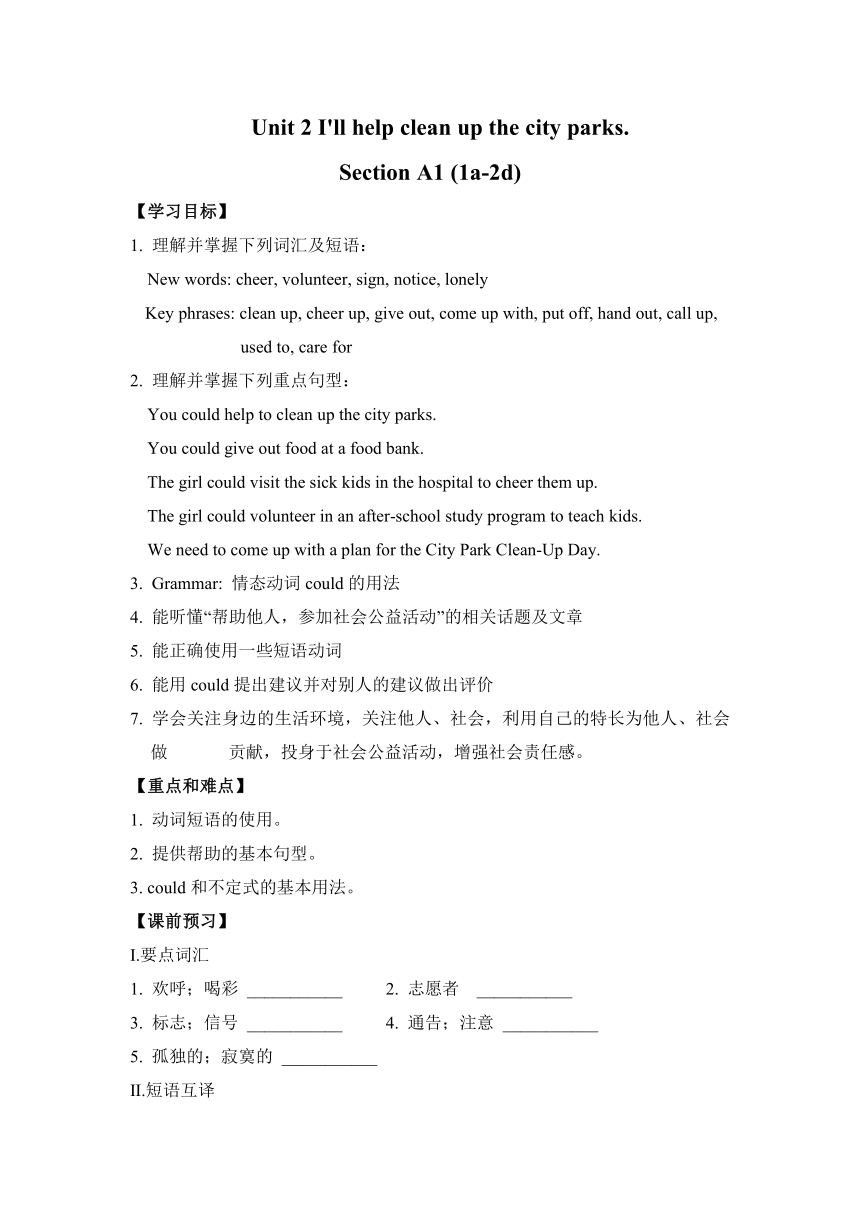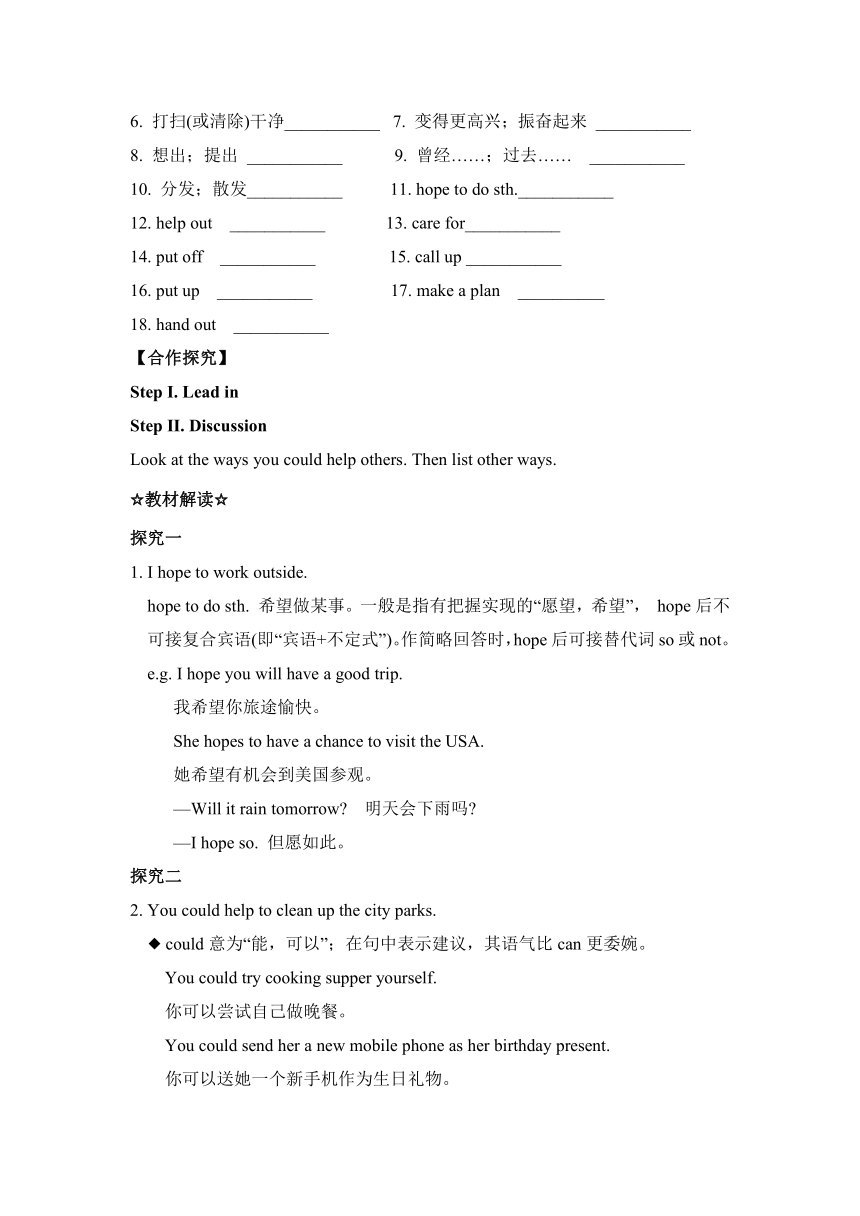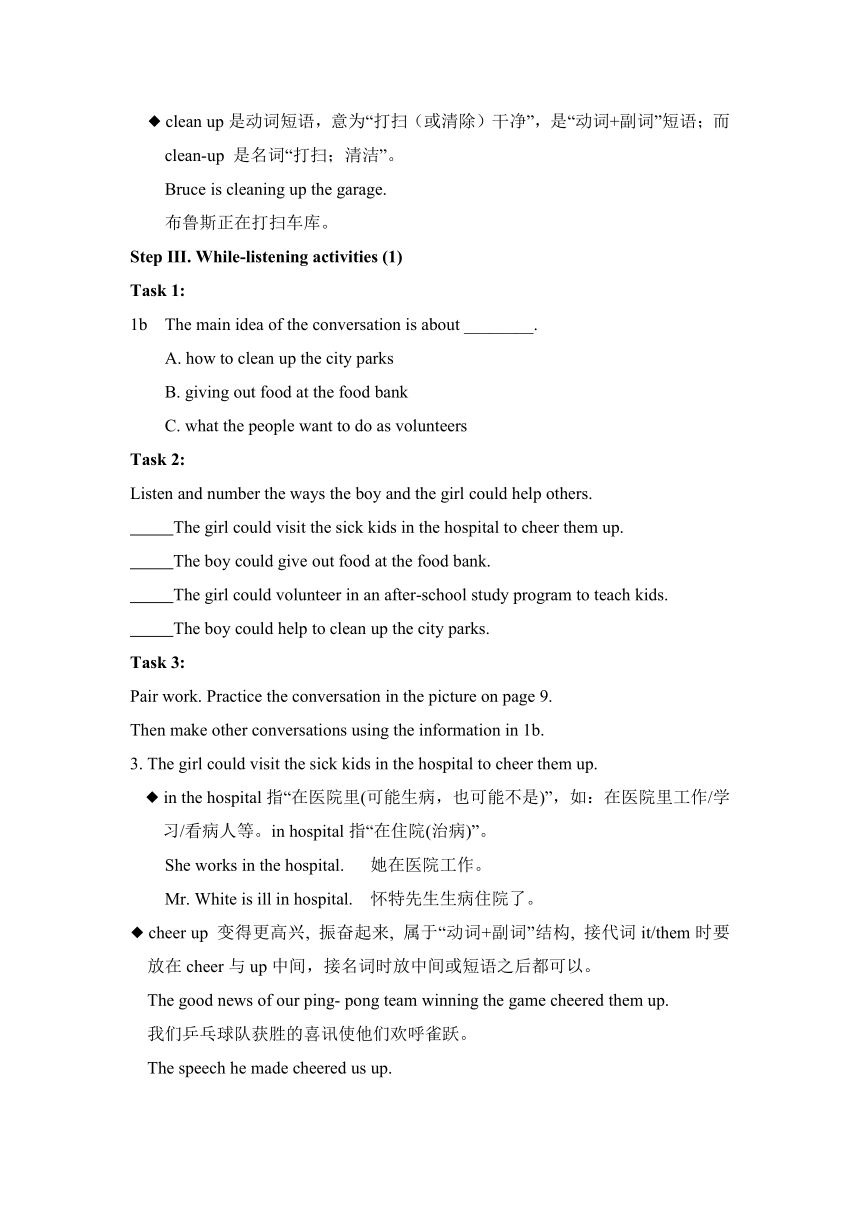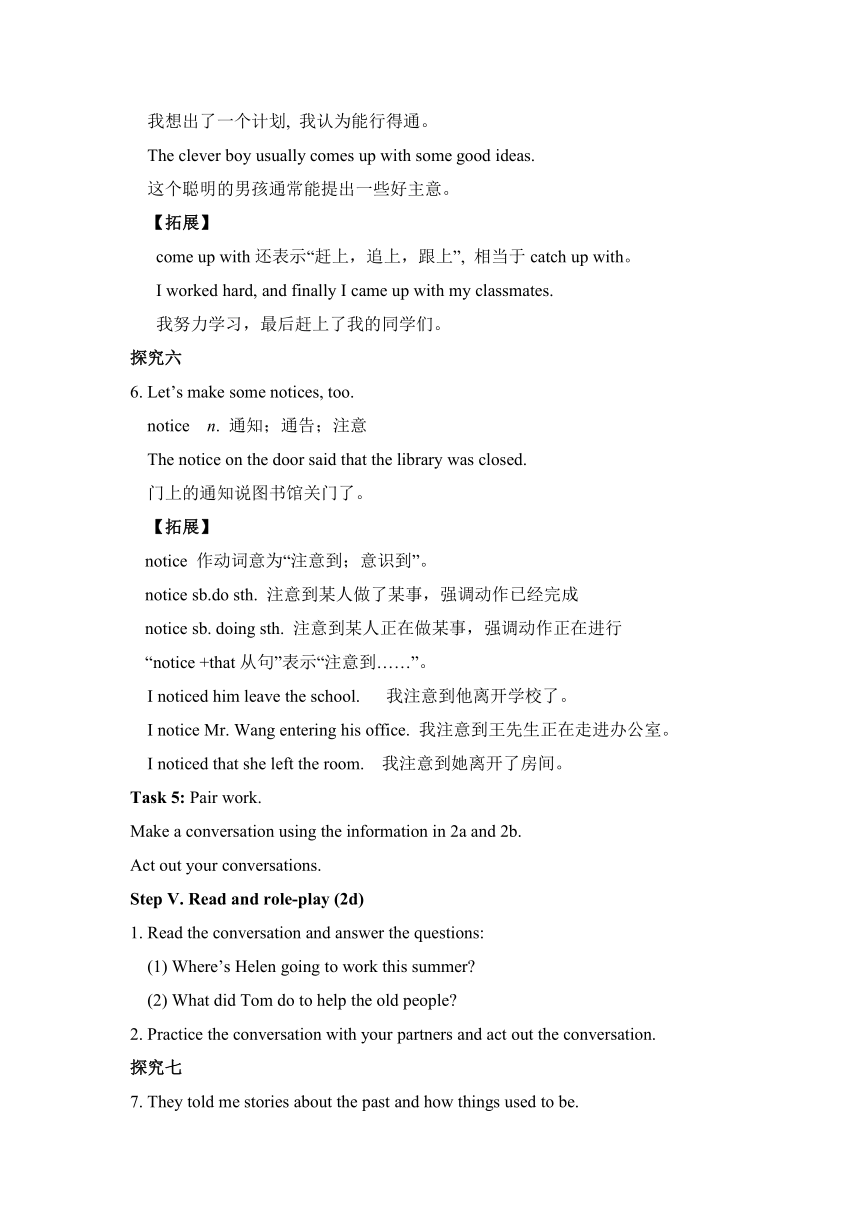人教版八年级下册Unit 2 I'll help to clean up the city parks. Section A1 (1a-2d) 导学案(含答案)
文档属性
| 名称 | 人教版八年级下册Unit 2 I'll help to clean up the city parks. Section A1 (1a-2d) 导学案(含答案) |  | |
| 格式 | docx | ||
| 文件大小 | 29.9KB | ||
| 资源类型 | 教案 | ||
| 版本资源 | 人教新目标(Go for it)版 | ||
| 科目 | 英语 | ||
| 更新时间 | 2023-02-09 22:26:36 | ||
图片预览





文档简介
Unit 2 I'll help clean up the city parks.
Section A1 (1a-2d)
【学习目标】
理解并掌握下列词汇及短语:
New words: cheer, volunteer, sign, notice, lonely
Key phrases: clean up, cheer up, give out, come up with, put off, hand out, call up, used to, care for
理解并掌握下列重点句型:
You could help to clean up the city parks.
You could give out food at a food bank.
The girl could visit the sick kids in the hospital to cheer them up.
The girl could volunteer in an after-school study program to teach kids.
We need to come up with a plan for the City Park Clean-Up Day.
Grammar: 情态动词could的用法
能听懂“帮助他人,参加社会公益活动”的相关话题及文章
能正确使用一些短语动词
能用could提出建议并对别人的建议做出评价
学会关注身边的生活环境,关注他人、社会,利用自己的特长为他人、社会做 贡献,投身于社会公益活动,增强社会责任感。
【重点和难点】
1. 动词短语的使用。
2. 提供帮助的基本句型。
3. could和不定式的基本用法。
【课前预习】
Ⅰ.要点词汇
1. 欢呼;喝彩 ___________ 2. 志愿者 ___________
3. 标志;信号 ___________ 4. 通告;注意 ___________
5. 孤独的;寂寞的 ___________
Ⅱ.短语互译
6. 打扫(或清除)干净___________ 7. 变得更高兴;振奋起来 ___________
8. 想出;提出 ___________ 9. 曾经……;过去…… ___________
10. 分发;散发___________ 11. hope to do sth.___________
12. help out ___________ 13. care for___________
14. put off ___________ 15. call up ___________
16. put up ___________ 17. make a plan __________
18. hand out ___________
【合作探究】
Step Ⅰ. Lead in
Step Ⅱ. Discussion
Look at the ways you could help others. Then list other ways.
☆教材解读☆
探究一
1. I hope to work outside.
hope to do sth. 希望做某事。一般是指有把握实现的“愿望,希望”, hope后不可接复合宾语(即“宾语+不定式”)。作简略回答时,hope后可接替代词so或not。
e.g. I hope you will have a good trip.
我希望你旅途愉快。
She hopes to have a chance to visit the USA.
她希望有机会到美国参观。
—Will it rain tomorrow 明天会下雨吗
—I hope so. 但愿如此。
探究二
2. You could help to clean up the city parks.
◆ could意为“能,可以”;在句中表示建议,其语气比can更委婉。
You could try cooking supper yourself.
你可以尝试自己做晚餐。
You could send her a new mobile phone as her birthday present.
你可以送她一个新手机作为生日礼物。
◆ clean up是动词短语,意为“打扫(或清除)干净”,是“动词+副词”短语;而clean-up 是名词“打扫;清洁”。
Bruce is cleaning up the garage.
布鲁斯正在打扫车库。
Step Ⅲ. While-listening activities (1)
Task 1:
1b The main idea of the conversation is about ________.
A. how to clean up the city parks
B. giving out food at the food bank
C. what the people want to do as volunteers
Task 2:
Listen and number the ways the boy and the girl could help others.
The girl could visit the sick kids in the hospital to cheer them up.
The boy could give out food at the food bank.
The girl could volunteer in an after-school study program to teach kids.
The boy could help to clean up the city parks.
Task 3:
Pair work. Practice the conversation in the picture on page 9.
Then make other conversations using the information in 1b.
3. The girl could visit the sick kids in the hospital to cheer them up.
◆ in the hospital指“在医院里(可能生病,也可能不是)”,如:在医院里工作/学习/看病人等。in hospital指“在住院(治病)”。
She works in the hospital. 她在医院工作。
Mr. White is ill in hospital. 怀特先生生病住院了。
◆ cheer up 变得更高兴, 振奋起来, 属于“动词+副词”结构, 接代词it/them时要放在cheer与up中间,接名词时放中间或短语之后都可以。
The good news of our ping- pong team winning the game cheered them up.
我们乒乓球队获胜的喜讯使他们欢呼雀跃。
The speech he made cheered us up.
他所做的演讲使我们振奋起来。
探究四
4. The boy could give out food at the food bank.
give out意为“分发,散发”,相当于hand out,属于“动词+副词”结构,接代词it/them时要放在give与out中间,接名词时放其后、中间都可以。
Please give out the exam papers before class.
请在课前发考试试卷。
These storybooks are interesting. Please give them out to the children.
这些故事书很有趣。请把它们分给孩子们。
Step Ⅳ. While-listening activities (2)
Task 1: Listen and find the general idea of 2a & 2b.
Please listen to the recording and choose the main idea of the conversation.
( )The main idea of the conversation is about _________.
A. the ways to tell people about a City Park Clean-Up Day
B. handing out advertisements
C. how to put up signs
Task 2: Listen and check (√) the things they are going to do to tell people about it.
Task 3: Listen and match.
Please listen to the recording again, and match the phrasal verbs with the objects.
Phrasal verb Object
come up with making a plan
put off a plan
put up ten students
hand out signs
call up notices
Task 4: Work on 2b. Listen again. Fill in the blanks on page 10.
探究五
5. We need to come up with a plan for the City Park Clean-Up Day.
come up with (针对问题/方法等)提出或想出(主意等),相当于think up。
I have come up with a plan and I think it will work.
我想出了一个计划, 我认为能行得通。
The clever boy usually comes up with some good ideas.
这个聪明的男孩通常能提出一些好主意。
【拓展】
come up with还表示“赶上,追上,跟上”, 相当于catch up with。
I worked hard, and finally I came up with my classmates.
我努力学习,最后赶上了我的同学们。
探究六
6. Let’s make some notices, too.
notice n. 通知;通告;注意
The notice on the door said that the library was closed.
门上的通知说图书馆关门了。
【拓展】
notice 作动词意为“注意到;意识到”。
notice sb.do sth. 注意到某人做了某事,强调动作已经完成
notice sb. doing sth. 注意到某人正在做某事,强调动作正在进行
“notice +that从句”表示“注意到……”。
I noticed him leave the school. 我注意到他离开学校了。
I notice Mr. Wang entering his office. 我注意到王先生正在走进办公室。
I noticed that she left the room. 我注意到她离开了房间。
Task 5: Pair work.
Make a conversation using the information in 2a and 2b.
Act out your conversations.
Step Ⅴ. Read and role-play (2d)
1. Read the conversation and answer the questions:
(1) Where’s Helen going to work this summer
(2) What did Tom do to help the old people
2. Practice the conversation with your partners and act out the conversation.
探究七
7. They told me stories about the past and how things used to be.
used to曾经……, 过去……, 后面跟动词原形, 表示过去的习惯动作或过去存在的情况。
used to do sth. 表示“过去常常做某事(现在不做了)、过去曾经做某事”。
used to的疑问形式有两种: 一种是把used提到句首, 或在句首加 Did, used变为 use。否定形式也有两种:didn’t use to或used not to。
The city is no longer the one that it used to be.
这个城市已不是过去的样子了。
I used to spend a lot of time playing games with my friends.
我过去花许多时间与朋友们一起玩游戏。
They didn’t use to live here.
他们过去未曾住在这儿。
探究八
8. Yeah, a lot of old people are lonely.
lonely adj. 孤独的;寂寞的
When his wife and two little children left him, he was very lonely.
妻子和两个孩子离他而去之后, 他感到很孤独。
【辨析】 alone, lonely
(1)alone作形容词和副词, 强调客观上的“独自一人;单独一人”,不表示内心的感受
I like to read alone. 我喜欢独自一人读书。
He is alone there. 只有他在那儿。
(2) lonely只能作形容词,强调主观上是“孤独的;寂寞的”,表达了渴望有人陪伴的情感,可作表语和定语。
I never feel lonely because I have many friends here.
我从未感到孤独寂寞, 因为我这儿有许多朋友。
At heart, Mr. Smith is a lonely man.
从内心来讲,史密斯先生是个孤独的人。
探究九
9. We should listen to them and care for them.
care for 意为“照顾;非常喜欢”, 多用于肯定句,相当于 take care of, look after。
They cared for the child day and night. 他们日夜照顾这个孩子。
【课时小结】
本节课学习了“帮助他人,参加社会公益活动”的相关话题及文章,短语动词的一些用法以及如何用could提出建议并对别人的建议做出评价。
单词:cheer, volunteer, sign, notice, lonely
词组:clean up, cheer up, give out, come up with, put off, hand out, call up, used to,
care for
句型:
You could help to clean up the city parks.
You could give out food at a food bank.
The girl could visit the sick kids in the hospital to cheer them up.
The girl could volunteer in an after-school study program to teach kids.
We need to come up with a plan for the City Park Clean-Up Day.
We should listen to them and care for them.
语法:情态动词could的用法; 短语动词
【达标检测】
Ⅰ. 用所给词的适当形式填空。
Now people hope __________ (eat) healthily and begin to care about the safety of food.
When I was walking past the window, I noticed Wang Fei __________ (copy) my homework. I really got annoyed.
Yang Fen spends every Saturday afternoon volunteering in an old __________ (people) home.
I used to__________ (eat) dumplings, but these days I’m used to having bread and milk.
We can’t put off __________ (make) a plan.
Ⅱ. 用方框中所给短语的适当形式填空
clean up, cheer up, give out, used to, come up with
6. Look! Lots of college students are _______ cards on the street.
7. He __________ a plan for the meeting just now.
8. Alice is helping her mother to __________ the kitchen.
9. The children __________ quickly when I agreed to help them.
10. She __________ be thin, but now she is a little fat.
Ⅲ.补全对话
A: Would you like to have dinner with me this evening, Bob
B: 11 Maybe another time.
A: What are you doing
B: I’m making a plan. 12
A: What plan Is it very important
B: Yes. I always do volunteer work on the first Saturday of every month.
A: 13
B: I help out at the children’s hospital. I help to plan some activities.
A: 14
B: Of course. You could help to make the sick children happy.
A: 15 I can tell them some interesting stories.
A. Oh, I’d love to do that.
B. I must finish it on time.
C. Sorry, I can’t. I’m busy.
D. Err...Bob, could I join you
E. I did that last summer.
F. What kind of volunteer work do you do
G. We can’t put off making a plan.
Ⅳ.单项填空
16. We can ask our parents __________ us finish the work.
A. help B. helping C. helped D. to help
17. You are not allowed to __________ advertisements on this wall without special permission(允许).
A. put down B. put on C. put up D. put off
18.—Are you all __________
—Yes. We always __________ to help sick people in the hospital.
A. volunteers, volunteer B. volunteer, volunteers
C. volunteers, volunteers D. volunteer, volunteer
19. At the party, I noticed her __________ behind me.
A. standing B. stood C. to stand D. stands
20. I __________ to school by bike, but now I __________
A. used to go, used to walking B. used to go, am used to walk
C. used to going, am used to walk D. used to go, am used to walking
【自我评价】
1. 本课我学会了什么?
_______________________________________________________
2. 通过本课的学习,我还有哪些疑问?
_______________________________________________________
参考答案:
【课前预习】
Ⅰ. 1. cheer 2. volunteer 3. sign 4. notice 5. lonely
Ⅱ. 6. clean up 7. cheer up 8. come up with 9. used to
10. give out /hand out 11. 希望做某事 12. 帮助……摆脱困难
13. 照顾;关心 14. 推迟 15. 打电话
16. 张贴 17. 制订计划 18. 分发
【合作探究】
探究二:Task 1: C Task 2: 3 2 4 1
探究四:
Task 1:A Task 2: b√ c√ e √
Task 3: come up with → a plan; put off → making a plan;
put up → signs; hand out → notices; call up → ten students
探究六:
Step V
1. (1) She’s going to work in an old people’s home.
(2) Reading the newspaper or just talking to the old people.
【达标检测】
Ⅰ. 1. to eat 2. copying 3. people’s 4. eat 5. making
Ⅱ. 6. giving out 7. came up with 8. clean up 9. cheered up 10. used to
Ⅲ. 11. C 12. B 13. F 14. D 15. A
Ⅳ. 16. D 17. C 18. A 19. A 20. D
Section A1 (1a-2d)
【学习目标】
理解并掌握下列词汇及短语:
New words: cheer, volunteer, sign, notice, lonely
Key phrases: clean up, cheer up, give out, come up with, put off, hand out, call up, used to, care for
理解并掌握下列重点句型:
You could help to clean up the city parks.
You could give out food at a food bank.
The girl could visit the sick kids in the hospital to cheer them up.
The girl could volunteer in an after-school study program to teach kids.
We need to come up with a plan for the City Park Clean-Up Day.
Grammar: 情态动词could的用法
能听懂“帮助他人,参加社会公益活动”的相关话题及文章
能正确使用一些短语动词
能用could提出建议并对别人的建议做出评价
学会关注身边的生活环境,关注他人、社会,利用自己的特长为他人、社会做 贡献,投身于社会公益活动,增强社会责任感。
【重点和难点】
1. 动词短语的使用。
2. 提供帮助的基本句型。
3. could和不定式的基本用法。
【课前预习】
Ⅰ.要点词汇
1. 欢呼;喝彩 ___________ 2. 志愿者 ___________
3. 标志;信号 ___________ 4. 通告;注意 ___________
5. 孤独的;寂寞的 ___________
Ⅱ.短语互译
6. 打扫(或清除)干净___________ 7. 变得更高兴;振奋起来 ___________
8. 想出;提出 ___________ 9. 曾经……;过去…… ___________
10. 分发;散发___________ 11. hope to do sth.___________
12. help out ___________ 13. care for___________
14. put off ___________ 15. call up ___________
16. put up ___________ 17. make a plan __________
18. hand out ___________
【合作探究】
Step Ⅰ. Lead in
Step Ⅱ. Discussion
Look at the ways you could help others. Then list other ways.
☆教材解读☆
探究一
1. I hope to work outside.
hope to do sth. 希望做某事。一般是指有把握实现的“愿望,希望”, hope后不可接复合宾语(即“宾语+不定式”)。作简略回答时,hope后可接替代词so或not。
e.g. I hope you will have a good trip.
我希望你旅途愉快。
She hopes to have a chance to visit the USA.
她希望有机会到美国参观。
—Will it rain tomorrow 明天会下雨吗
—I hope so. 但愿如此。
探究二
2. You could help to clean up the city parks.
◆ could意为“能,可以”;在句中表示建议,其语气比can更委婉。
You could try cooking supper yourself.
你可以尝试自己做晚餐。
You could send her a new mobile phone as her birthday present.
你可以送她一个新手机作为生日礼物。
◆ clean up是动词短语,意为“打扫(或清除)干净”,是“动词+副词”短语;而clean-up 是名词“打扫;清洁”。
Bruce is cleaning up the garage.
布鲁斯正在打扫车库。
Step Ⅲ. While-listening activities (1)
Task 1:
1b The main idea of the conversation is about ________.
A. how to clean up the city parks
B. giving out food at the food bank
C. what the people want to do as volunteers
Task 2:
Listen and number the ways the boy and the girl could help others.
The girl could visit the sick kids in the hospital to cheer them up.
The boy could give out food at the food bank.
The girl could volunteer in an after-school study program to teach kids.
The boy could help to clean up the city parks.
Task 3:
Pair work. Practice the conversation in the picture on page 9.
Then make other conversations using the information in 1b.
3. The girl could visit the sick kids in the hospital to cheer them up.
◆ in the hospital指“在医院里(可能生病,也可能不是)”,如:在医院里工作/学习/看病人等。in hospital指“在住院(治病)”。
She works in the hospital. 她在医院工作。
Mr. White is ill in hospital. 怀特先生生病住院了。
◆ cheer up 变得更高兴, 振奋起来, 属于“动词+副词”结构, 接代词it/them时要放在cheer与up中间,接名词时放中间或短语之后都可以。
The good news of our ping- pong team winning the game cheered them up.
我们乒乓球队获胜的喜讯使他们欢呼雀跃。
The speech he made cheered us up.
他所做的演讲使我们振奋起来。
探究四
4. The boy could give out food at the food bank.
give out意为“分发,散发”,相当于hand out,属于“动词+副词”结构,接代词it/them时要放在give与out中间,接名词时放其后、中间都可以。
Please give out the exam papers before class.
请在课前发考试试卷。
These storybooks are interesting. Please give them out to the children.
这些故事书很有趣。请把它们分给孩子们。
Step Ⅳ. While-listening activities (2)
Task 1: Listen and find the general idea of 2a & 2b.
Please listen to the recording and choose the main idea of the conversation.
( )The main idea of the conversation is about _________.
A. the ways to tell people about a City Park Clean-Up Day
B. handing out advertisements
C. how to put up signs
Task 2: Listen and check (√) the things they are going to do to tell people about it.
Task 3: Listen and match.
Please listen to the recording again, and match the phrasal verbs with the objects.
Phrasal verb Object
come up with making a plan
put off a plan
put up ten students
hand out signs
call up notices
Task 4: Work on 2b. Listen again. Fill in the blanks on page 10.
探究五
5. We need to come up with a plan for the City Park Clean-Up Day.
come up with (针对问题/方法等)提出或想出(主意等),相当于think up。
I have come up with a plan and I think it will work.
我想出了一个计划, 我认为能行得通。
The clever boy usually comes up with some good ideas.
这个聪明的男孩通常能提出一些好主意。
【拓展】
come up with还表示“赶上,追上,跟上”, 相当于catch up with。
I worked hard, and finally I came up with my classmates.
我努力学习,最后赶上了我的同学们。
探究六
6. Let’s make some notices, too.
notice n. 通知;通告;注意
The notice on the door said that the library was closed.
门上的通知说图书馆关门了。
【拓展】
notice 作动词意为“注意到;意识到”。
notice sb.do sth. 注意到某人做了某事,强调动作已经完成
notice sb. doing sth. 注意到某人正在做某事,强调动作正在进行
“notice +that从句”表示“注意到……”。
I noticed him leave the school. 我注意到他离开学校了。
I notice Mr. Wang entering his office. 我注意到王先生正在走进办公室。
I noticed that she left the room. 我注意到她离开了房间。
Task 5: Pair work.
Make a conversation using the information in 2a and 2b.
Act out your conversations.
Step Ⅴ. Read and role-play (2d)
1. Read the conversation and answer the questions:
(1) Where’s Helen going to work this summer
(2) What did Tom do to help the old people
2. Practice the conversation with your partners and act out the conversation.
探究七
7. They told me stories about the past and how things used to be.
used to曾经……, 过去……, 后面跟动词原形, 表示过去的习惯动作或过去存在的情况。
used to do sth. 表示“过去常常做某事(现在不做了)、过去曾经做某事”。
used to的疑问形式有两种: 一种是把used提到句首, 或在句首加 Did, used变为 use。否定形式也有两种:didn’t use to或used not to。
The city is no longer the one that it used to be.
这个城市已不是过去的样子了。
I used to spend a lot of time playing games with my friends.
我过去花许多时间与朋友们一起玩游戏。
They didn’t use to live here.
他们过去未曾住在这儿。
探究八
8. Yeah, a lot of old people are lonely.
lonely adj. 孤独的;寂寞的
When his wife and two little children left him, he was very lonely.
妻子和两个孩子离他而去之后, 他感到很孤独。
【辨析】 alone, lonely
(1)alone作形容词和副词, 强调客观上的“独自一人;单独一人”,不表示内心的感受
I like to read alone. 我喜欢独自一人读书。
He is alone there. 只有他在那儿。
(2) lonely只能作形容词,强调主观上是“孤独的;寂寞的”,表达了渴望有人陪伴的情感,可作表语和定语。
I never feel lonely because I have many friends here.
我从未感到孤独寂寞, 因为我这儿有许多朋友。
At heart, Mr. Smith is a lonely man.
从内心来讲,史密斯先生是个孤独的人。
探究九
9. We should listen to them and care for them.
care for 意为“照顾;非常喜欢”, 多用于肯定句,相当于 take care of, look after。
They cared for the child day and night. 他们日夜照顾这个孩子。
【课时小结】
本节课学习了“帮助他人,参加社会公益活动”的相关话题及文章,短语动词的一些用法以及如何用could提出建议并对别人的建议做出评价。
单词:cheer, volunteer, sign, notice, lonely
词组:clean up, cheer up, give out, come up with, put off, hand out, call up, used to,
care for
句型:
You could help to clean up the city parks.
You could give out food at a food bank.
The girl could visit the sick kids in the hospital to cheer them up.
The girl could volunteer in an after-school study program to teach kids.
We need to come up with a plan for the City Park Clean-Up Day.
We should listen to them and care for them.
语法:情态动词could的用法; 短语动词
【达标检测】
Ⅰ. 用所给词的适当形式填空。
Now people hope __________ (eat) healthily and begin to care about the safety of food.
When I was walking past the window, I noticed Wang Fei __________ (copy) my homework. I really got annoyed.
Yang Fen spends every Saturday afternoon volunteering in an old __________ (people) home.
I used to__________ (eat) dumplings, but these days I’m used to having bread and milk.
We can’t put off __________ (make) a plan.
Ⅱ. 用方框中所给短语的适当形式填空
clean up, cheer up, give out, used to, come up with
6. Look! Lots of college students are _______ cards on the street.
7. He __________ a plan for the meeting just now.
8. Alice is helping her mother to __________ the kitchen.
9. The children __________ quickly when I agreed to help them.
10. She __________ be thin, but now she is a little fat.
Ⅲ.补全对话
A: Would you like to have dinner with me this evening, Bob
B: 11 Maybe another time.
A: What are you doing
B: I’m making a plan. 12
A: What plan Is it very important
B: Yes. I always do volunteer work on the first Saturday of every month.
A: 13
B: I help out at the children’s hospital. I help to plan some activities.
A: 14
B: Of course. You could help to make the sick children happy.
A: 15 I can tell them some interesting stories.
A. Oh, I’d love to do that.
B. I must finish it on time.
C. Sorry, I can’t. I’m busy.
D. Err...Bob, could I join you
E. I did that last summer.
F. What kind of volunteer work do you do
G. We can’t put off making a plan.
Ⅳ.单项填空
16. We can ask our parents __________ us finish the work.
A. help B. helping C. helped D. to help
17. You are not allowed to __________ advertisements on this wall without special permission(允许).
A. put down B. put on C. put up D. put off
18.—Are you all __________
—Yes. We always __________ to help sick people in the hospital.
A. volunteers, volunteer B. volunteer, volunteers
C. volunteers, volunteers D. volunteer, volunteer
19. At the party, I noticed her __________ behind me.
A. standing B. stood C. to stand D. stands
20. I __________ to school by bike, but now I __________
A. used to go, used to walking B. used to go, am used to walk
C. used to going, am used to walk D. used to go, am used to walking
【自我评价】
1. 本课我学会了什么?
_______________________________________________________
2. 通过本课的学习,我还有哪些疑问?
_______________________________________________________
参考答案:
【课前预习】
Ⅰ. 1. cheer 2. volunteer 3. sign 4. notice 5. lonely
Ⅱ. 6. clean up 7. cheer up 8. come up with 9. used to
10. give out /hand out 11. 希望做某事 12. 帮助……摆脱困难
13. 照顾;关心 14. 推迟 15. 打电话
16. 张贴 17. 制订计划 18. 分发
【合作探究】
探究二:Task 1: C Task 2: 3 2 4 1
探究四:
Task 1:A Task 2: b√ c√ e √
Task 3: come up with → a plan; put off → making a plan;
put up → signs; hand out → notices; call up → ten students
探究六:
Step V
1. (1) She’s going to work in an old people’s home.
(2) Reading the newspaper or just talking to the old people.
【达标检测】
Ⅰ. 1. to eat 2. copying 3. people’s 4. eat 5. making
Ⅱ. 6. giving out 7. came up with 8. clean up 9. cheered up 10. used to
Ⅲ. 11. C 12. B 13. F 14. D 15. A
Ⅳ. 16. D 17. C 18. A 19. A 20. D
同课章节目录
- Unit 1 What's the matter?
- Section A
- Section B
- Unit 2 I'll help to clean up the city parks.
- Section A
- Section B
- Unit 3 Could you please clean your room?
- Section A
- Section B
- Unit 4 Why don't you talk to your parents?
- Section A
- Section B
- Unit 5 What were you doing when the rainstorm came
- Section A
- Section B
- Review of Units 1-5
- Unit 6 An old man tried to move the mountains.
- Section A
- Section B
- Unit 7 What's the highest mountain in the world?
- Section A
- Section B
- Unit 8 Have you read Treasure Island yet?
- Section A
- Section B
- Unit 9 Have you ever been to a museum?
- Section A
- Section B
- Unit 10 I've had this bike for three years.
- Section A
- Section B
